In a residential area of Nishijin, about 20 minutes by car from Kyoto Station, there is a discrete building with a distinctive light gray curtain on its entrance.
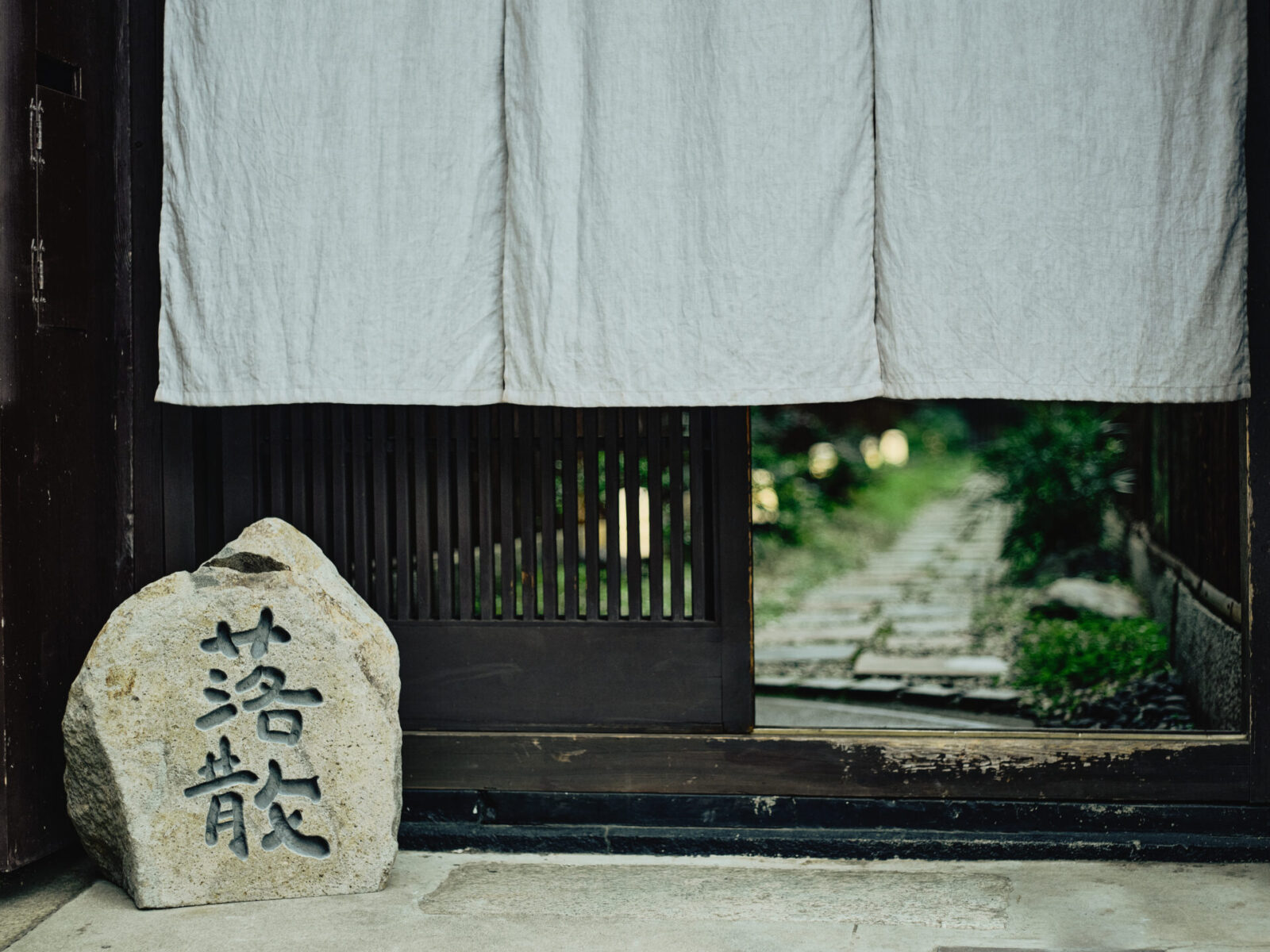
On the other side of the entrance there is a path just wide enough for one person that continues for roughly ten meters. The path is sheltered on both sides with wooden fences and the view quickly narrows. When you open the door at the end of the path, the inside is just dimly lit.
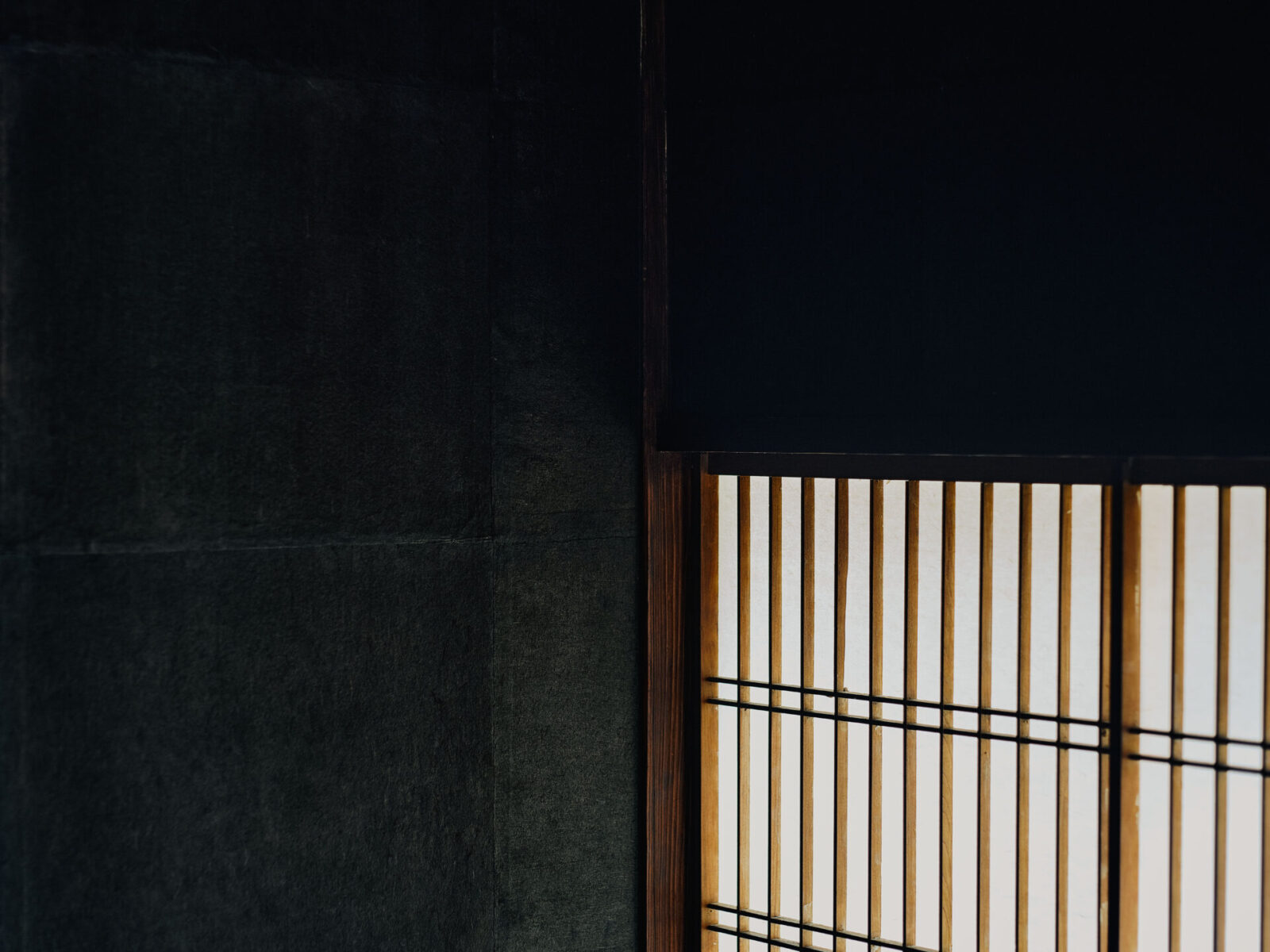
We were welcomed by Kiruta Wataru, who introduced us to this place named the Meditation Room.
Kiruta tells us, “I wanted to reduce the amount of visual information coming in as much as possible.”
He says that this space is “an experimental room, a space to face your inner self, and a place that we created for ourselves.”
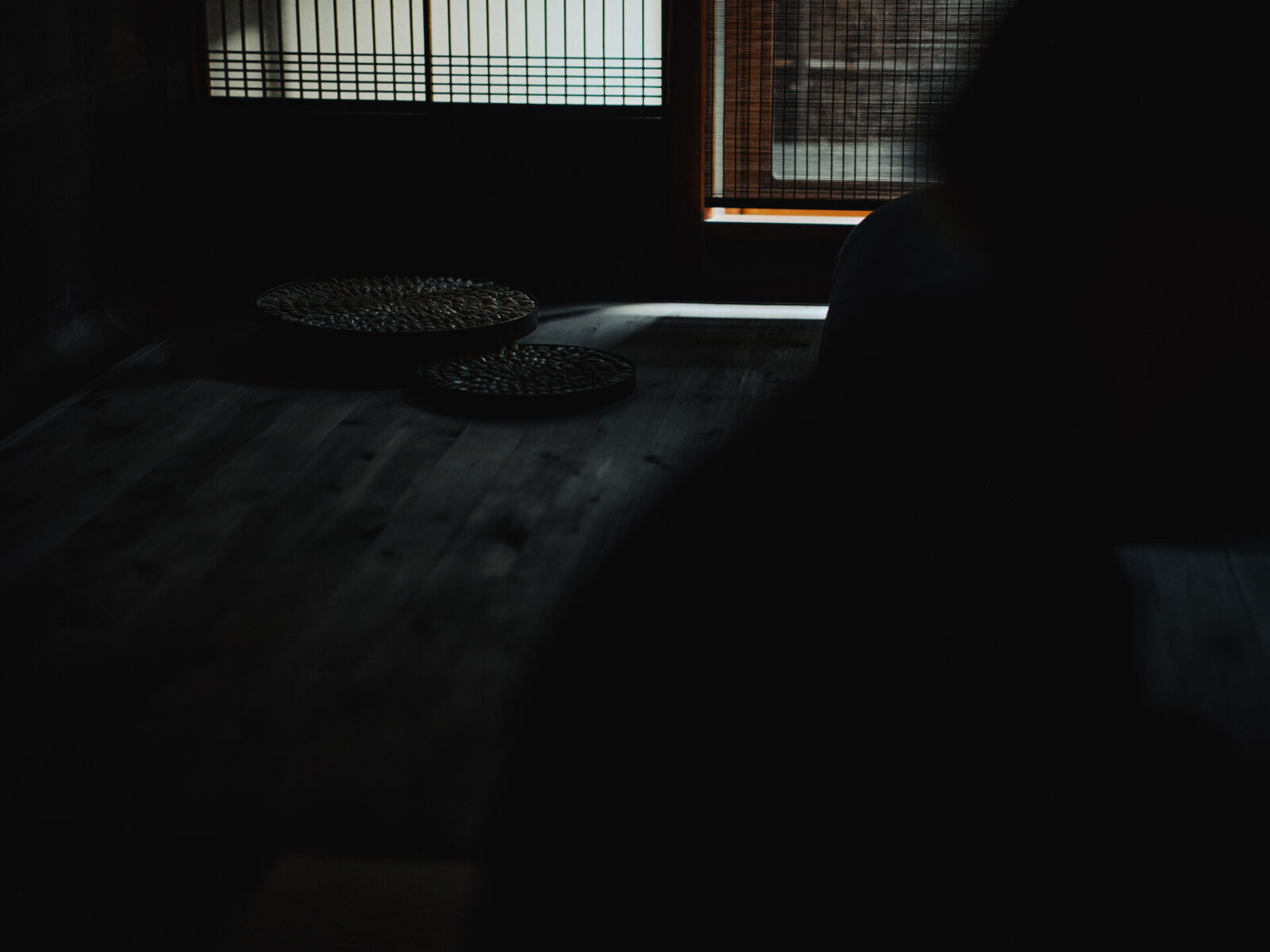
The room acts as a base for Ochill, an art collective which has released projects such as “Tea Smoking”, a reinterpretation of the shikohin experience of smoking that uses only tea leaves instead of cigarettes, and “Listen to the Tobacco” a tobacco experience that is enjoyed by burning tobacco rather than inhaling it.
Kiruta is one of the founding members along with Daichi Isokawa, the producer of the shisha café Iwashi Club. The meditation room opened to the public in June, and visitors can experience green tea and “Tea Smoking” prepared by Daichi.
They say that they leave it up to individuals to find their own meaning behind the time spent in the Meditation Room, but Kiruta says “It is a space and time where people can release themselves of the ideals they placed upon themselves and contemplate the incremental differences they find. I hope it will be a place where people can discover what truly makes them happy.”
Behind these words is Ochill’s philosophy that is expressed through the word “well-down”.
They say this word was created out of a sense of incongruity they had toward the popular trend of “well-being” that is currently taking over the world. We talked to them to find out more.
(text:Yuuki Honda photo:Eichi Tano edit:Masayuki Koike)
The new shikohin experiences of “Tea Smoking and “Listen to the Cigarettes”
── The “Tea Smoking” and “Listen to the Cigarettes” is an experience that can be had in the Meditation Room. Is it a concept created by the two of you?
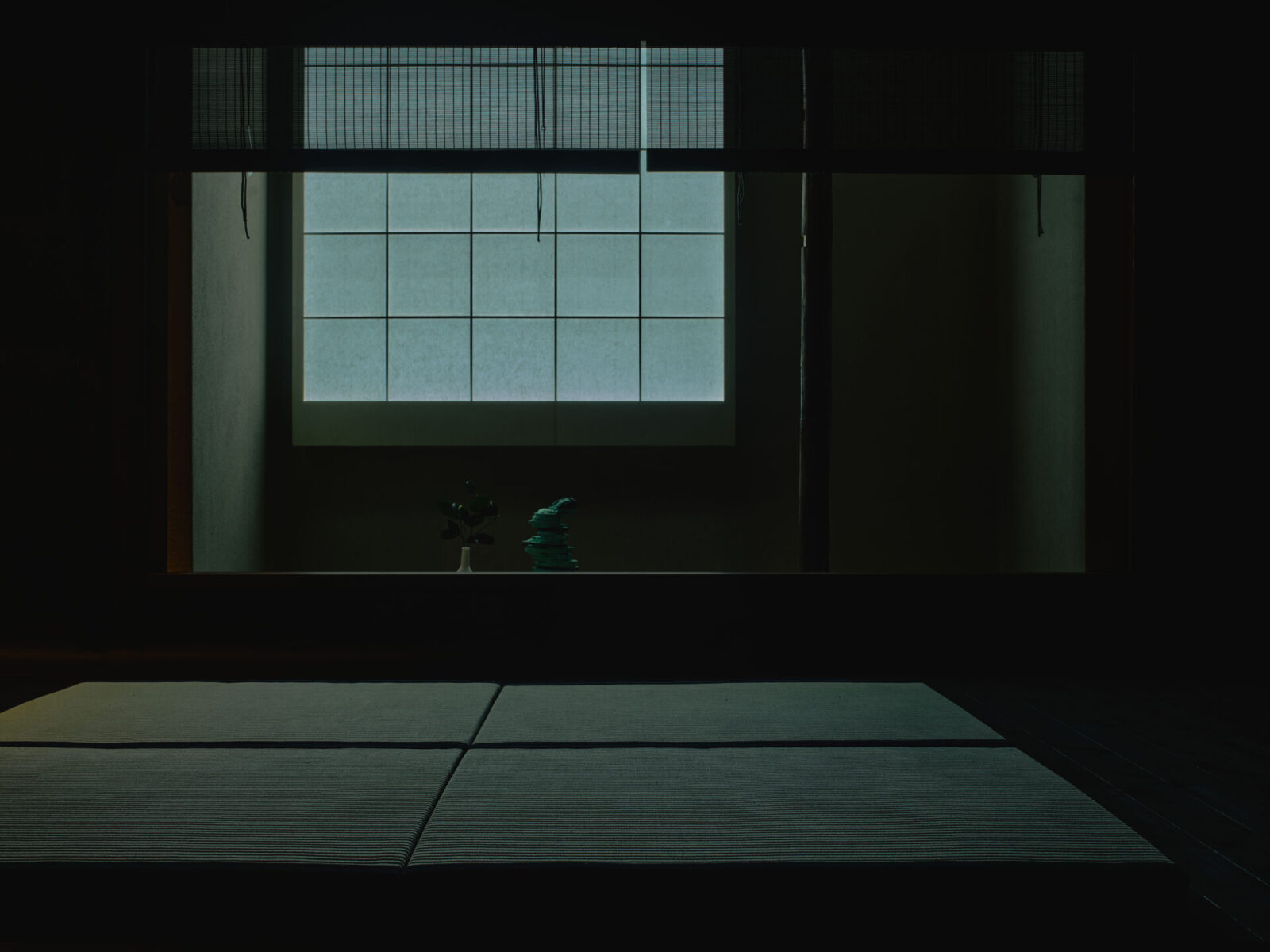
Kiruta: Yes. I was a regular customer at the Iwashi Club and I was talking to the owner Daichi of the possibility of expressing chill culture, including shisha, which was spreading among Japan at the time (2018), to a more international audience. I suggested that miso or tea flavored shisha may be good and we began casually experimenting with new products. As we posted our products on social media, we garnered a lot of attention.
We had plans to present our products at the SXSW (South by Southwest, an annual film, music, and technology festival held in Austin, Texas, USA) in 2020, but the event was canceled due to the coronavirus pandemic.
Through various connections after that we were able to work with several companies and research institutes to create TEASHA, a project to develop a non-nicotine shisha brand with tea leaves, which would be the first of its kind in Japan. We then continued our research and development on flavors and hardware, as well as analyzed the safety of the product.
At the same time our “Tea Smoking” products were garnering more attention and we began getting invitations to tea related events. Daichi used to practice the tea ceremony so we began promoting “Tea Smoking” through holding tea ceremony events.
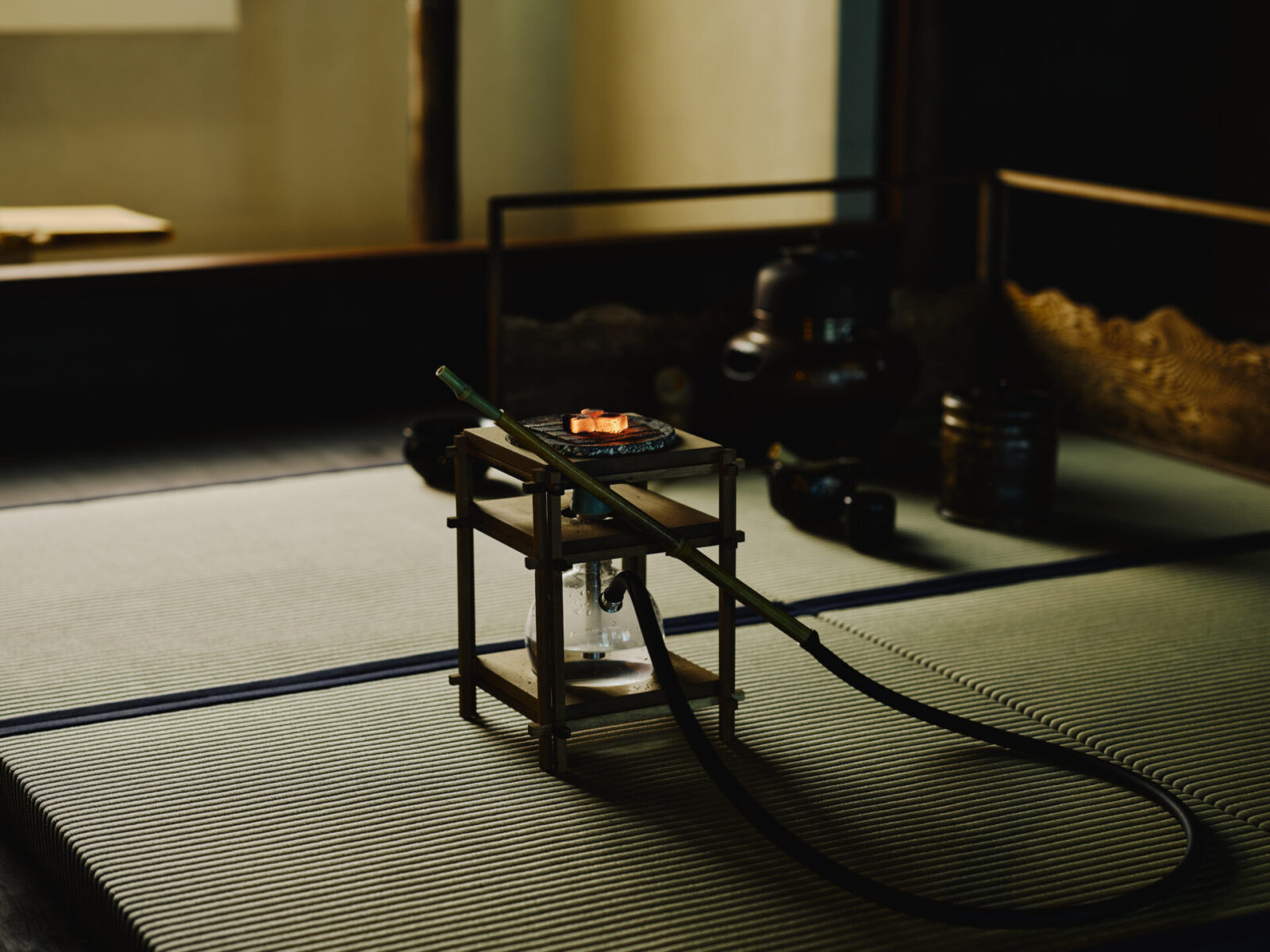
A small smoking table placed in the Meditation Room for the “Tea Smoking” experience.
── Was Ochill’s other hit product “Listen to the Cigarettes” also created through these tea ceremony events?
Kiruta: When I was invited to participate in the “KYOTO FRAGMENT ART PROJECT” held at Maruyama Park in Kyoto, I intentionally wanted to present something besides “Tea Smoking” so we presented “Listen to the Cigarettes”. There were many families with kids at the event and we were surprised to find many of them eagerly wanted to participate in our demonstration even after we told them that we were using tobacco leaves.
Although tobacco is generally known as something you smoke, we thought that it can be a shikohin experience that is enjoyed visually and that was how “Listen to the Cigarettes” was created.
Through the action of burning tobacco leaves we found that there is a public nature in the “Listen to the Cigarettes” experience and also a private nature in the act of smoking cigarettes. I think we were able to take away some of the negative images surrounding tobacco. By reconstructing how the product is enjoyed, we are able to create a shikohin that will be more widely accepted, even if it is the same tobacco product.
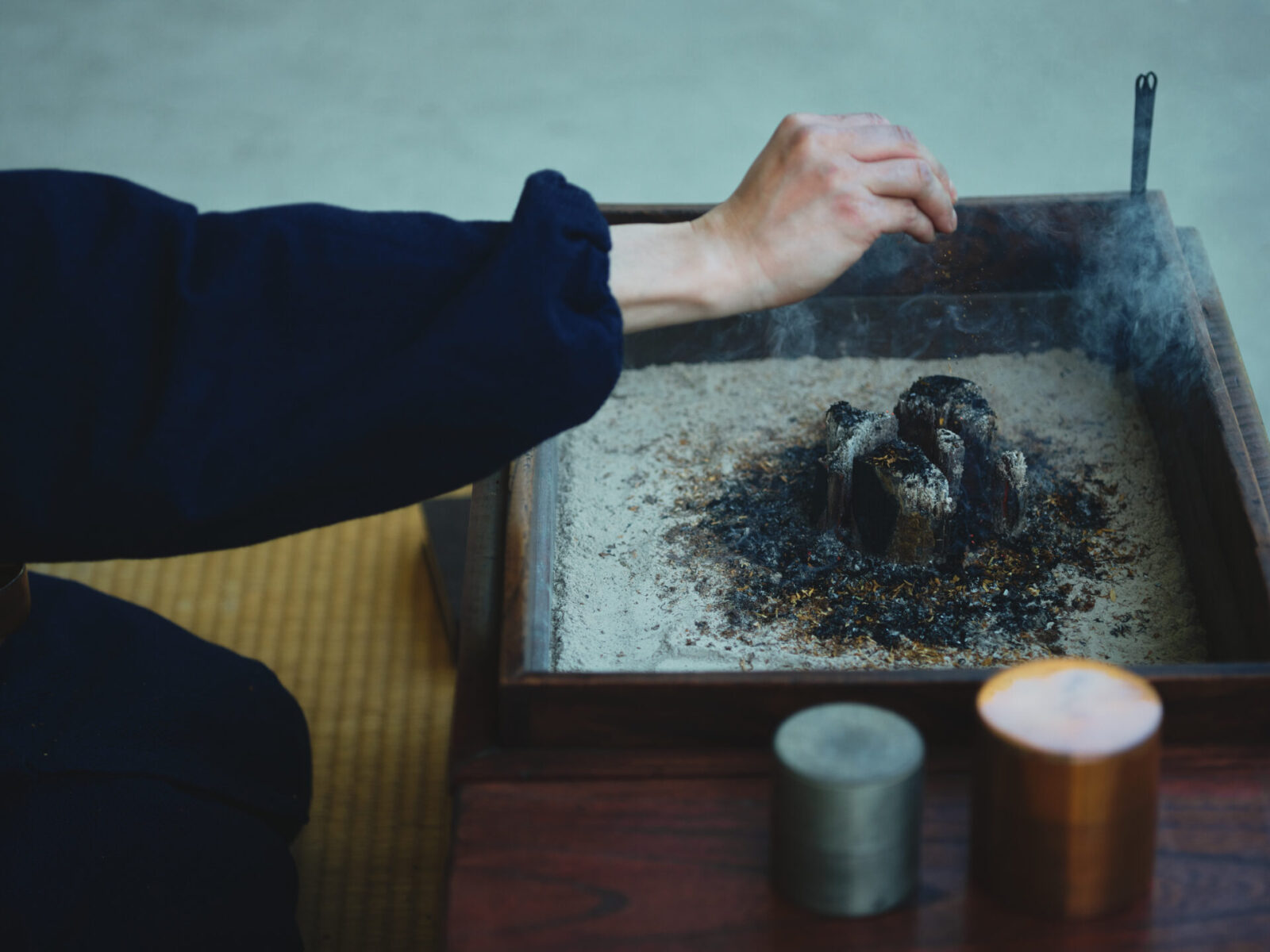
“Listen to the Cigarettes” was created by Ochill
We found that “Tea Smoking” also took away the aversion toward the act of smoking and the biases around it in the same way.

Questioning the trend of “well-being” and discovering “well-down”
── Would you say that both “Tea Smoking” and “Listen to the Cigarettes” have reconstructed the image behind the tobacco experience and created a new shikohin experience?
Kiruta: Yes. I think that what we have always been aiming for was different from “well-being” which was often advocated at the time. Shikohin has always been about bringing people happiness, but it seems that many shikohin lost their place as the scientific definition of “health” became more defined.
It seems that the toxic traits that make common shikohin such as alcohol, nicotine and caffeine a shikohin experience has been singled out and these products are now only regarded as being toxic. This made me envision a future world that only valued functionality where such shikohin would be disregarded and that was disconcerting.
Let’s say that the goal of “well-being” is to be physically, mentally and socially fulfilled. In order to achieve this goal, everyone strives for one ideal state of good health and improved quality of sleep and rest. Tools such as the Apple Watch occasionally remind people to breathe deeply.
This may be the “right” thing to do according to the goal of achieving “well-being”, but I personally found it to be very boring.
I am a smoker myself and I also enjoy drinking. I am a night owl and I can’t get up in the morning. My schedule is irregular and although I know I may not be a very disciplined person, I enjoy that kind of lifestyle. I felt that the word “well-being” implied that we should all try to correct such behaviors and I personally found that to be very uncomfortable.
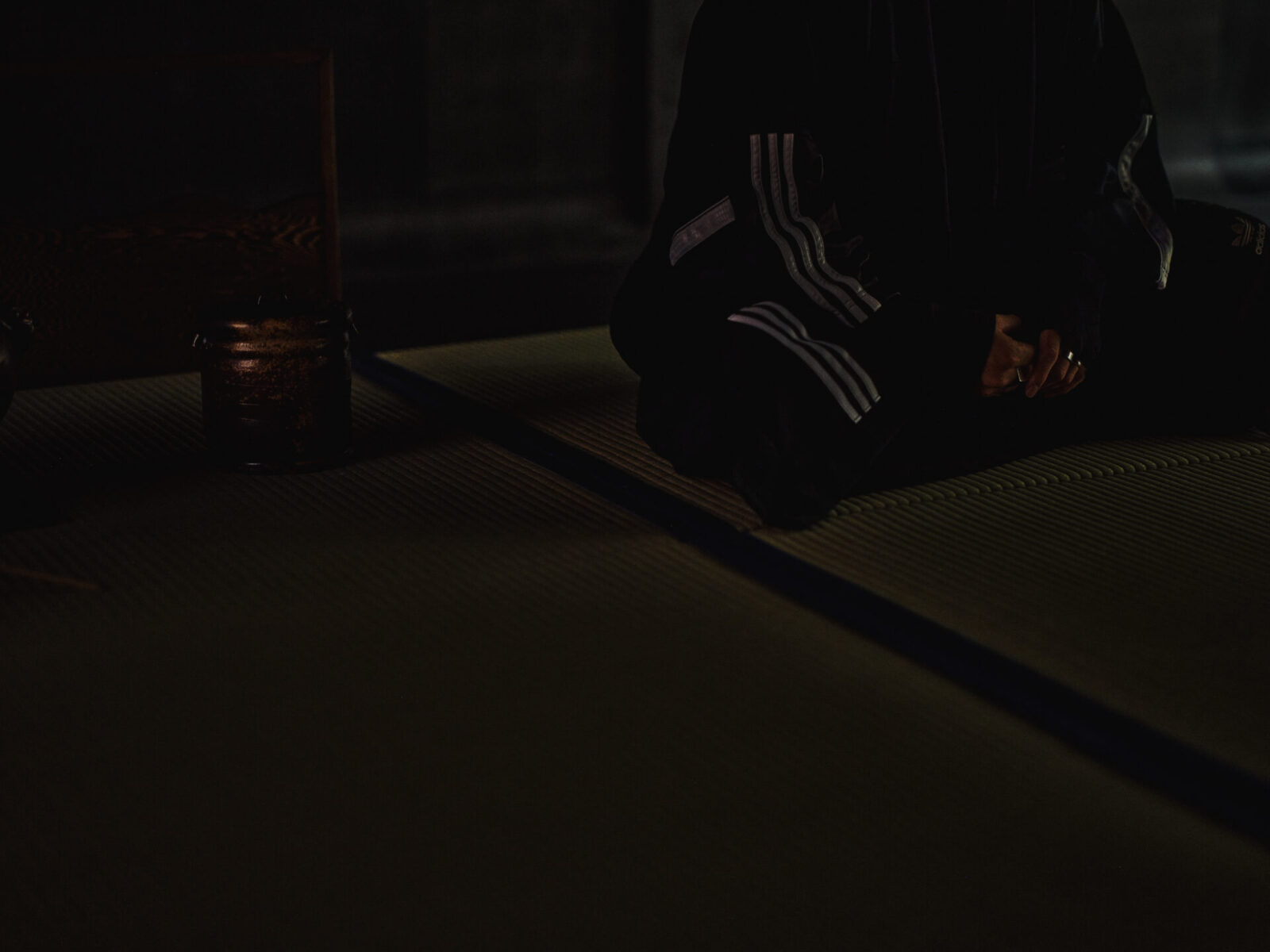
── It seems that there is a sense of incongruity with the term “well-being” that is at the core of Ochill’s ideas and philosophy.
Kiruta: That is why we have reinterpreted the word “well-being” and put it into our own words by calling it “well-down”.
“well-down” is a state in which even if you deviate from society, there is no mental burden and you are naturally satisfied with yourself.
We advocate “falling into yourself as unpretending, obediently” as one of the states that people should be.
For example, there may be a point of view that drinking until morning is not a good choice to make. However, I am tired of the air in the current world that does not allow me to accept such bad choices.
── So the concept of “well-down” came from confronting your sense of incongruity with “well-being” and reinterpreting it.
Kiruta: Yes. Our desire for self-affirmation and acceptance is part of the human algorithm that we are born with, so I think it is a very natural thing to seek these things.
What is important is not whether or not you are accepted by others, but whether you are satisfied with yourself. Acceptance from others cannot be achieved from within so it is sought from the outside. However, whether or not you are satisfied with yourself can only come from inside.
Living in a world of “well-being” surrounds us with things like capital, honor, social media, and whether or not you are socially acceptable, but everyone has parts of themselves that they do not like and I think it is okay to be sloppy or dishonest sometimes.
To put it extremely, whether it be big or small everyone has a dark side to them, be it adultery, criminal history, divorce, etc. When we live in a society that only shows the good side of things, we focus too much on the dark parts of ourselves and turn our eyes away from them.
However, I believe that it is only after you understand and accept the dark parts inside you that you can find true strength. Even if you feel like you are hopeless, if you can face yourself and realize that there is still hope, you will find that there is a glimmer of light by accepting the darkness.
I felt that there was an overwhelming lack of opportunity, space, time and experiences in today’s world that allowed me to find self-affirmation and be satisfied with myself. That is why I wanted to create them. It was for my own sake, but also for the sake of others and it drove me to keep on creating.
I am not trying to flip off the idea behind “well-being”, nor am I trying to create a dichotomy between the two ideas by advocating “well-down”. However, as a smoker and a slacker who likes to stay up late, I just felt uncomfortable with a society that demands an overly clean and healthy lifestyle.
Daichi: Actually, I am definitely flipping off the idea of “well-being”. (laughs)
The term was first mentioned in 1946 along with the founding of the WHO. Although the idea itself may be great, it has been shred to the bones now hasn’t it? It sounds to me like we are being told to live longer so that we can spend more money. It feels to me like they are only showing the clean side of things. Honestly, I think that they may be saying grand things, but their assholes are just as dirty as anyone else. I feel that they should just speak the truth.
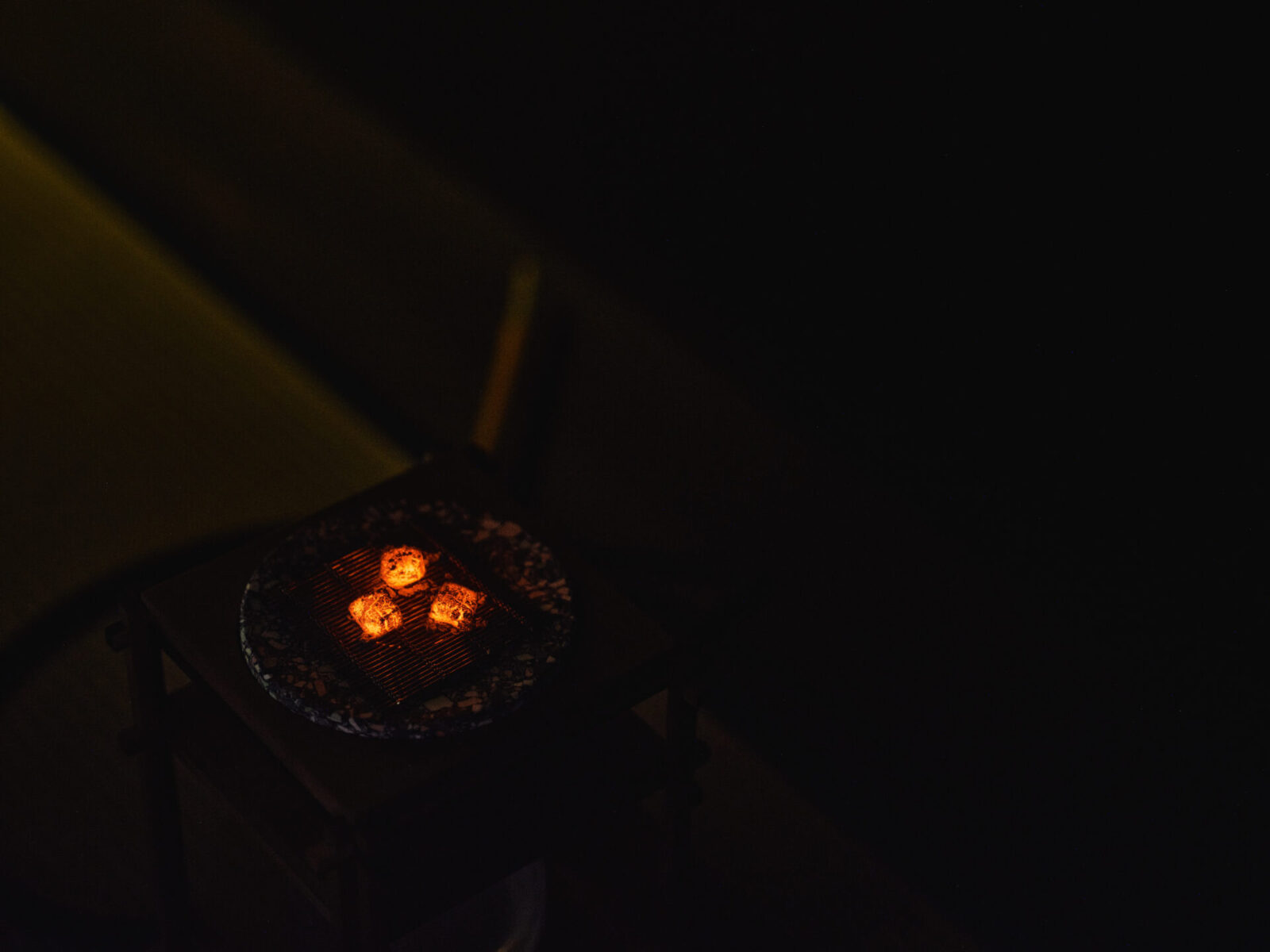
Daichi: This is why I really resonate with Kiruta’s concept of “well-down.”
As a lover of Buddhist and Zen literature, my understanding is that this is something similar to 知足按分 (chisoku anbun) (a Zen term which means to be content with oneself and one’s surroundings without greed or aspirations).
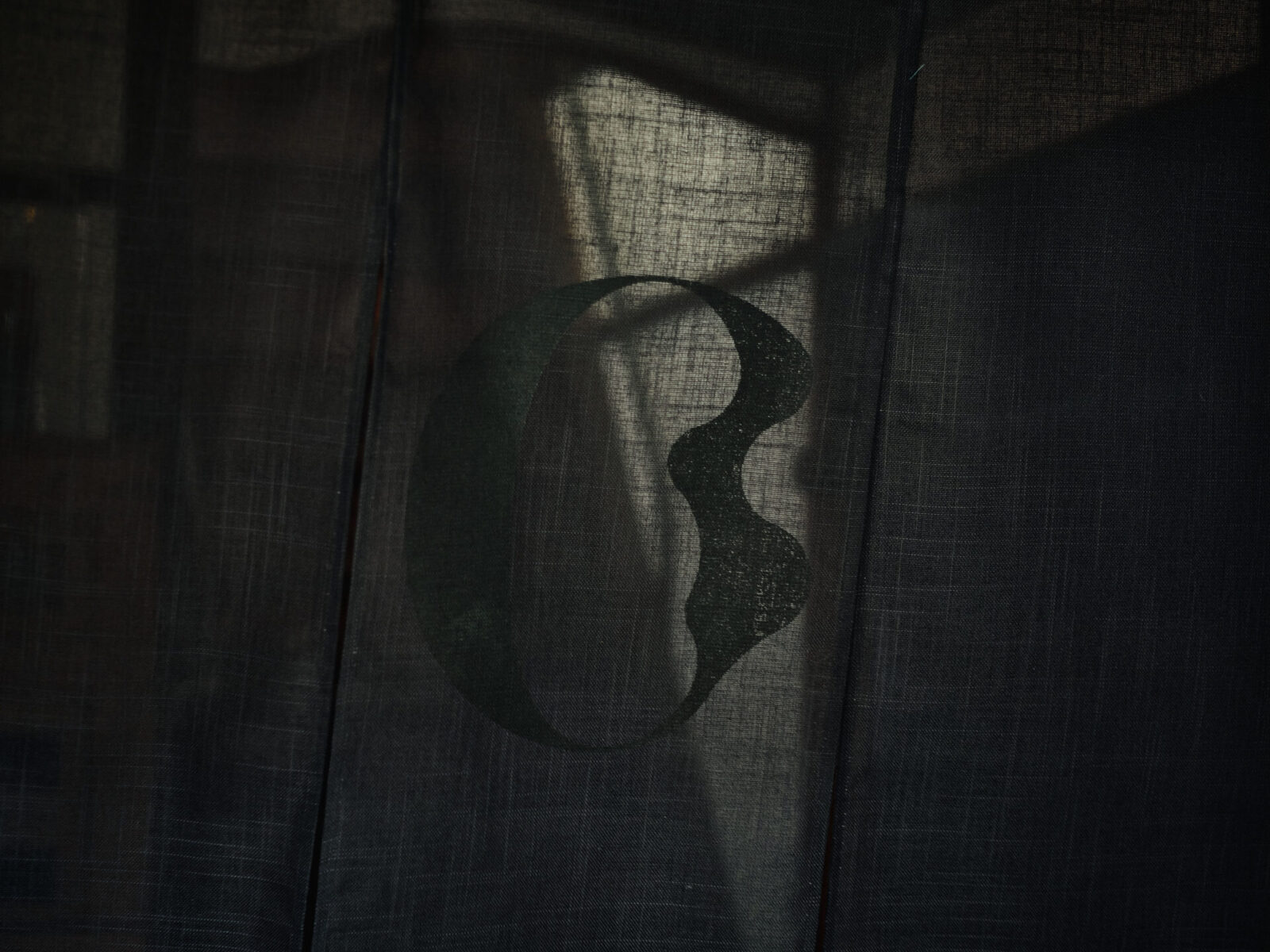
── I see that there is no unified definition or stance on the term “well-down” even within the Ochill team.
Kiruta: Not at all. Daichi has his own ideas and that is fine.
We use the term “well-down” simply as our attempt to better convey the meaning behind our activities and values. These ideas and values are always being updated and I believe that an idea becomes complete only after other people begin interpreting them on their own terms.
Although Ochill is a company, a part of me has a selfish desire of not wanting to do things just to make money. It is something different from the creations I have made in the past where I would create an established business proposal and work from there.
I don’t want to create something for the sake of showing others, but I want to create it for the sake of my desire to create. It is not how I want to be seen, but what I want to offer. Rather than doing something because it’s fun, I want to do it because I don’t understand it. These are the desires that I aspire to. There are scenes that can only be reached through creation, and nothing can be complete from the start. Things must be created multiple times and I want to create something that goes beyond just “ourselves”.
That is why we keep the stance of Ochill ambiguous and we each explore our own ways to define this word.
Moving between tension and release. Incremental differences found in aligning your shoes
── So you each have your own sense of incongruity with the concept of “well-being”?
Kiruta: I think so. For example, the moment the Apple Watch tells you to “take a deep breath”, it feels like an obligatory command. We feel that we need to breathe.
Obligatory commands lead to tension. For me, I can live easier if I can accept myself as someone who cannot live on command.

Ochill Kyoto has their Meditation Room on the first floor and their lounge on the 2nd floor that also acts as a space to create Ochill products. Unlike the Meditation Room, which remains dark and has a refined air even in midday, the lounge is filled with light and has a relaxing atmosphere.
Daichi: Speaking about obligatory commands, I once told Kiruta to align his shoes at the entrance.
Kiruta: Yes you did. I understand that it is better manners to align your shoes after taking them off, but everyone has some lazy aspect that can’t be proper all the time.
That’s why I couldn’t immediately say that I would be sure to do so next time. It might sound impertinent, but I think it is important to understand why that is better through actual experiences.
There is a sense that living in a mindful way leads to a healthy and fruitful life, but no one explains why it is better to align your shoes at the entrance. I feel that this act of trying to get people to align their shoes is a part of the “well-being” philosophy.
I think that too often we are being led to believe ideas such as, “it is better to have a tidy room”, or “it is better to exercise”, but it disregards whether the individual accepts that to be true or not. I’m sure there are some people who have no problem accepting these ideas, but it was difficult for me.
── Daichi, what was your intention when you told Kiruta to align his shoes?
Daichi: I wanted to suggest that he try doing things that may require some tension once in a while. This connects to the experience we offer in the Meditation Room, and I believe it is important to include incremental differences in our lives.
We ask people who come to the Meditation Room to first go to the lounge upstairs before entering the Meditation Room. Then we ask them to cleanse their mouth with water, eat some sweets, watch the matcha ceremony and receive their drink.
That is the basic flow of the experience, but the process involves tension and requires some focus. After that we perform “Listen to the Cigarettes” to allow a moment for the participants to relax and release the tension.
After that the participants meditate. I want them to be able to return to a neutral state by feeling the incremental differences and fluctuations they experienced earlier.
One participant described their experience here as being like a spiritual sauna.
── It’s true that saunas also include moments of tension and release and that is what makes it feel good and relaxing.
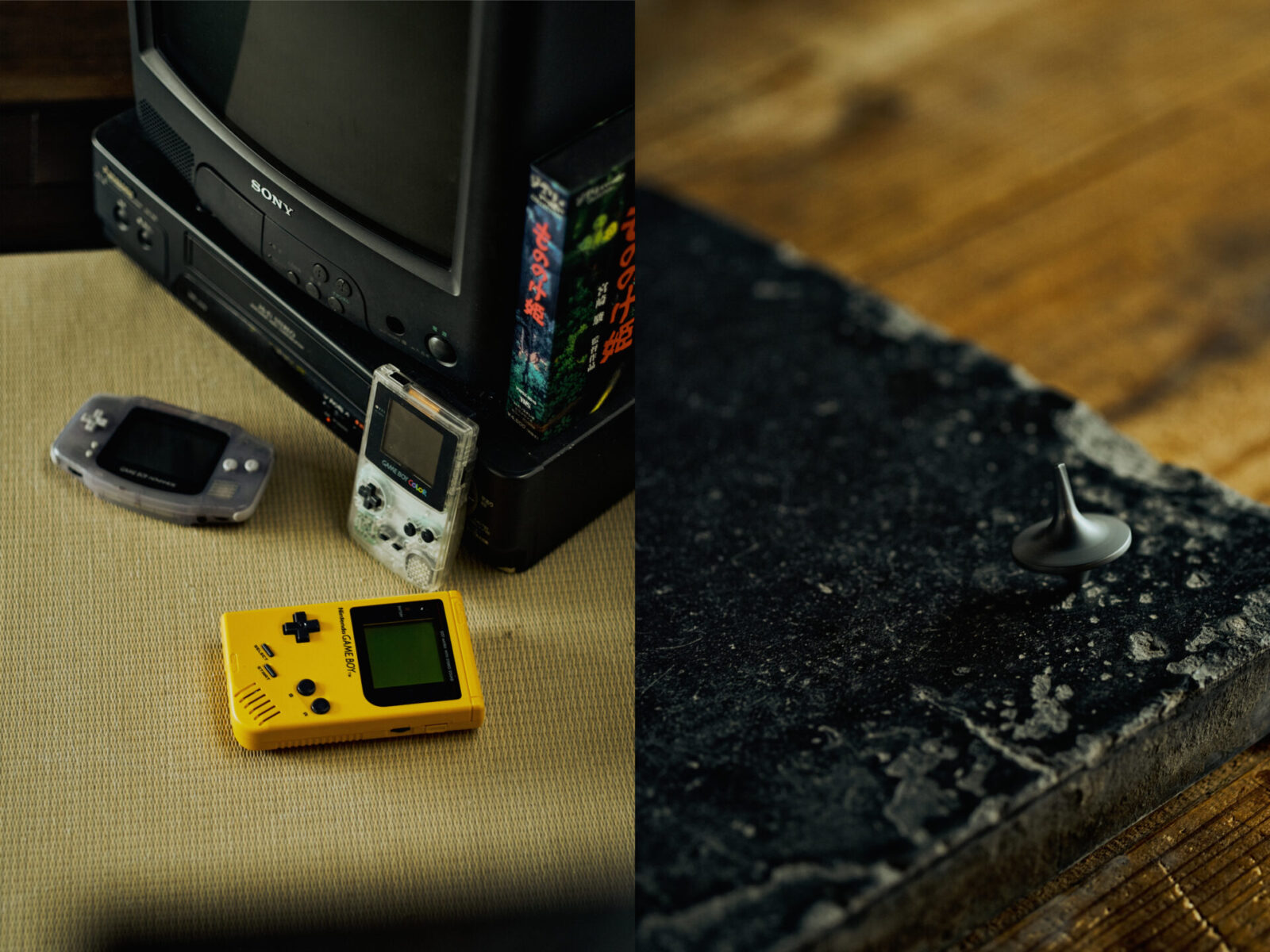
One of Ochill’s philosophies is the desire to “free oneself from the concept of time.” They believe that being able to feel the “accumulation of time” and “nostalgia (retro)” helps achieve this so they decorate the second floor lounge with objects that evoke feelings of nostalgia.
Kiruta: The topic of tension and release reminds me of the time we went to Kiyomizu-dera Temple during the coronavirus pandemic when it was completely empty. We took a nap in the hall known as Kiyomizu no Butai and it felt incredibly good.
Daichi: Of course the temple hall is a very structured space so I think it felt good to slack a little and take a nap there. That kind of incremental difference is what made it feel so good.
Kiruta: Our bodies were tired from climbing up the hill, but my state of mind was very relaxed and I felt good. I felt that my state was the complete opposite of how I feel when I am riding a cab in Tokyo and constantly thinking about work.
I feel like we are recreating what we felt in that experience in our Meditation Room. Perhaps that is how I am seeking to create the space of my desires.
But Daichi, you think differently don’t you?
Daichi: I don’t create things based on a plot in my mind. I started Iwashi Club on a whim and I am in Kyoto because Kiruta invited me here. I just followed along.

Overcoming the limits of Shisha through the tea ceremony
Daichi: Actually, the reason why I came to Kyoto may be because I simply became tired of shisha, or I began to feel its limitations.
── You became tired of shisha after working with it for more than ten years?
Daichi: I think it has been about 20 years since shisha came to Japan, but I feel that there is a limit to how much we can evolve the shisha experience on our own.
Kiruta: Shisha is a kind of tobacco, so there are laws in Japan that prevent us from making our own products.
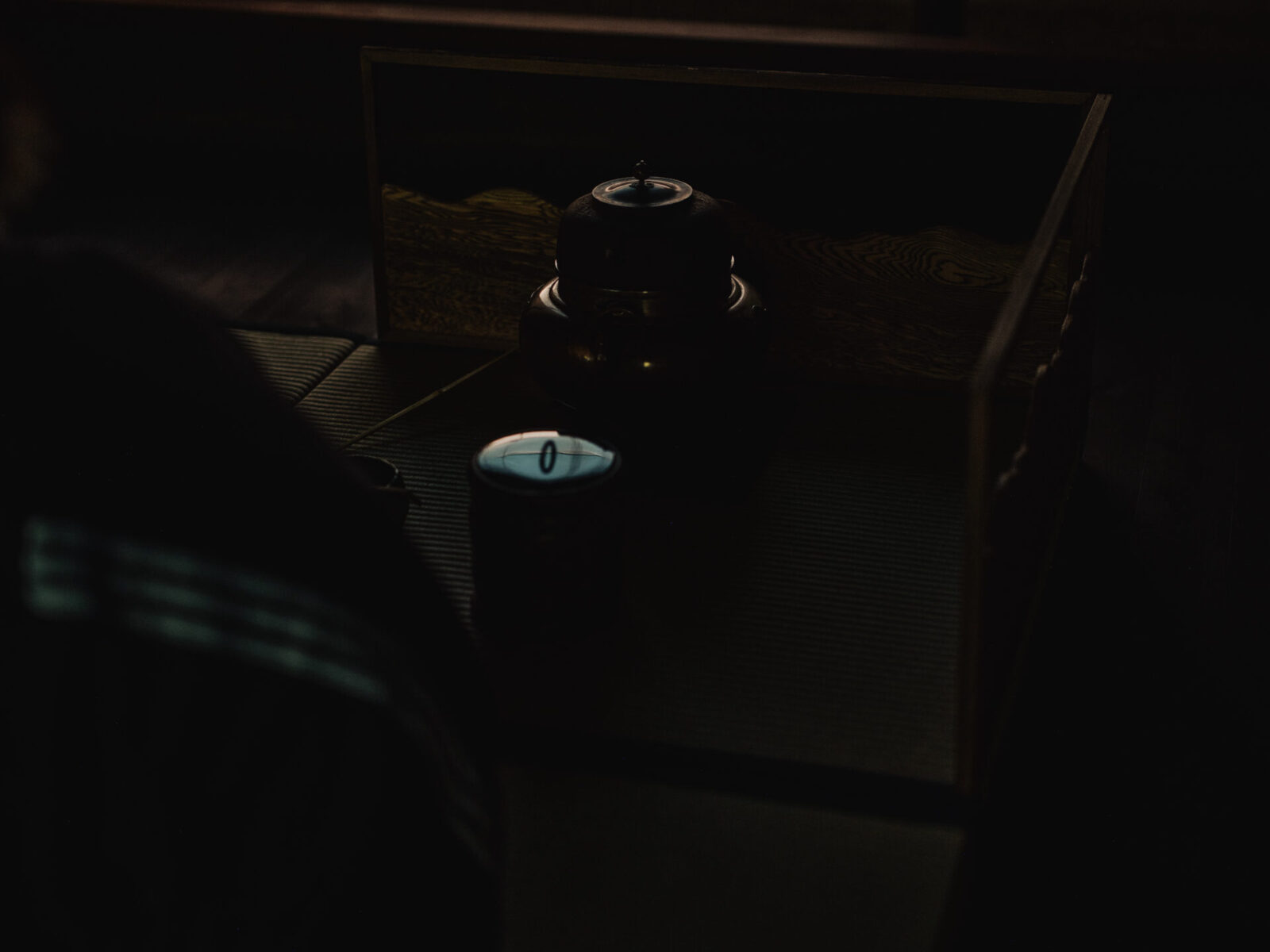
Daichi: That’s right. Plus, the shisha available nowadays are all too sweet. I wish the people who produce the shisha overseas will tweak the flavor and explore a bit more.
For example, there are ways that people can get more involved in production if it was a food. One could ask a farmer to create a special kind of vegetable for them, and there are various cooking methods to explore.
However, there are very few ways to play around with shisha in Japan. We explored a bit with “Tea Smoking”, but it is difficult to distribute it as a product.
So we began to see the limitations of what we can do with shisha.

Daichi: That’s why my journey with shisha kind of came to an end.
If there is anything more that I can do, I think it will be to advance the culture of shisha itself. Shisha requires one to smoke with a pipe so people who have a history of enjoying it start developing a certain posture and the way they smoke begins to look refined.
I am thinking about combining the tea ceremony with shisha by including tools like kiseru (Japanese pipe) because it shares a similar posture and refinement.
I had a little bit of experience with the tea ceremony in the past, and this exploration is why I am in the process of relearning it. I hope to use what I learn in the tea ceremony to take shisha to a higher level someday. The reason our Meditation Room also functions as a tea ceremony room comes from this selfish desire of mine.
── I see that the Meditation Room is also a place for both of you individually.
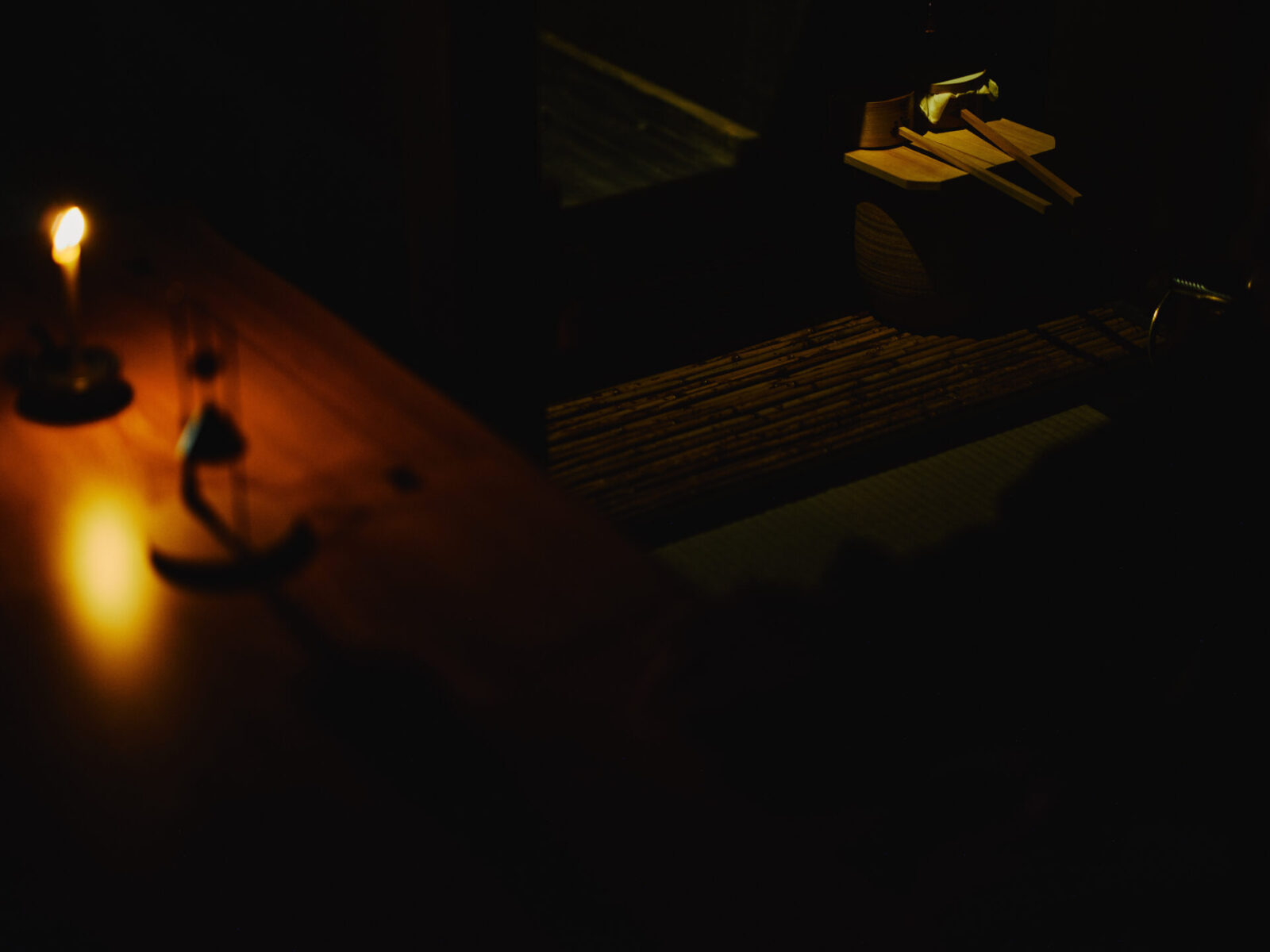
Daichi: Yes, I would say so. Although this is my personal observation, I think that the differences between me and Kiruta are also reflected in this Meditation Room.
I am a seeker and stoic, so I play the role of bringing tension while Kiruta is the opposite and he plays the role of bringing release.
I personally believe that you cannot enjoy shikohin unless you are disciplined in your everyday life.
What makes shikohin enjoyable is the incremental differences it brings between your regular time and the time you enjoy shikohin. By going to and from these two states, you are able to find your middle ground. Nothing can be understood by being on just one side.
Kiruta: While there are external pressures such as the belief that having more money (capital) is good, or having more followers (fame) is good, there are few opportunities or spaces where one can become aware of one’s true inner desires (happiness). That is why we tend to focus so much on the ideal images presented by the world (light) and we tend to deny our true self (darkness) which differs from the ideal.
We need opportunities to find affirmation without denial and become satisfied with ourselves. I hope that this Meditation Room will provide such an opportunity.
There has always been the concept in Japanese culture of “knowing what is enough” and I would like to create a space where people can release themselves from ideals and find the incremental differences in what they want to be. It is a space that can welcome people who have fallen to the deepest levels, and it provides a moment in time where we can feel that it is better to be alive than dead and you can feel like you are one room away from the other world. There is no past or future or present. You can find yourself and teach yourself something. It is a higher dimensional space and each individual’s universe.
Although there is nothing in this room, I hope anyone who has felt any kind of discomfort in their everyday lives will come here to experience this once.
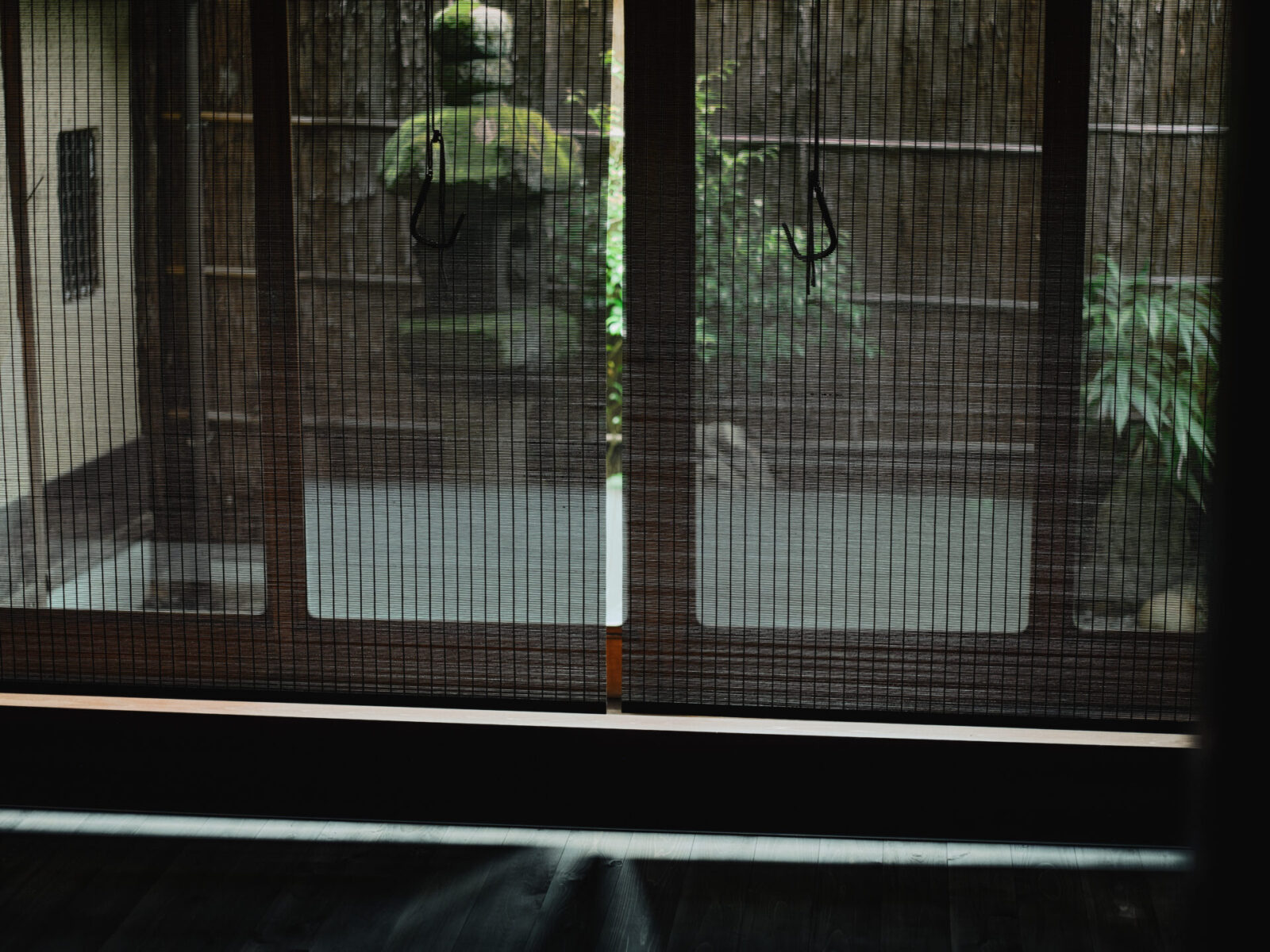
Translation: Sophia Swanson
From Fukuoka. Traveled around Japan on bicycle after graduating university and began freelance work at the same time.
Written for multiple media while on the road, traveling over 5000 km. Continues to write and edit today as well as occasional filming.
Favorite soccer team is Liverpool FC. YNWA.
Editor, Writer, etc., for PLANETS, designing, De-Silo, MIMIGURI, and various other media.
